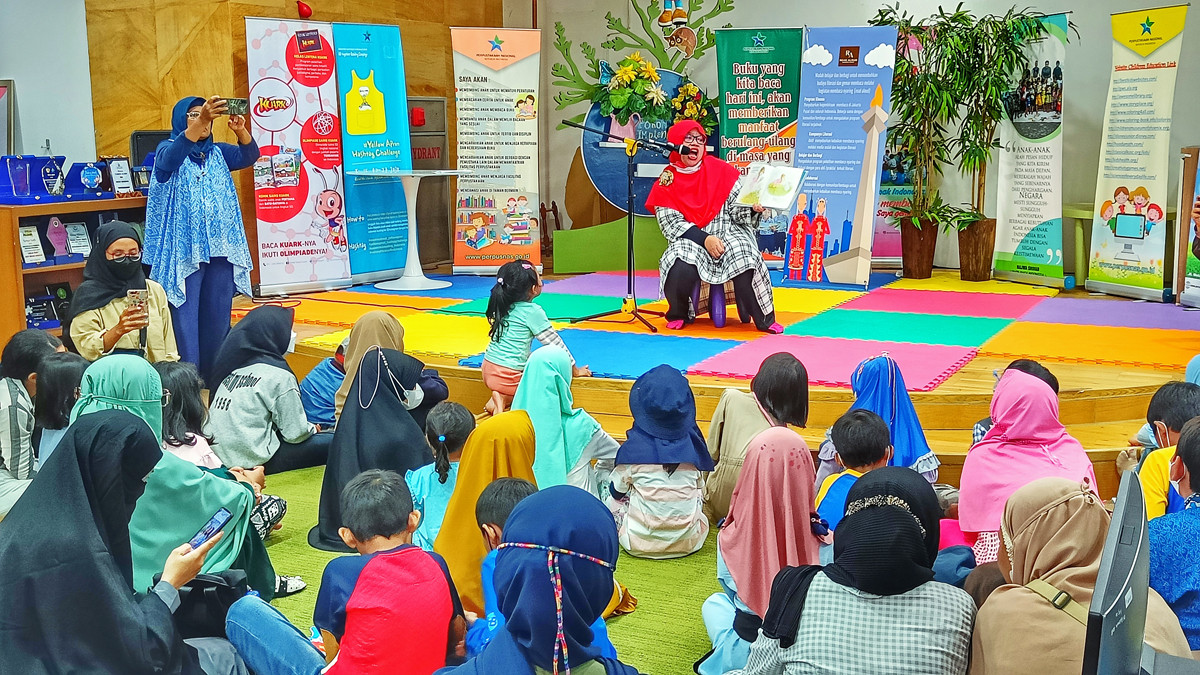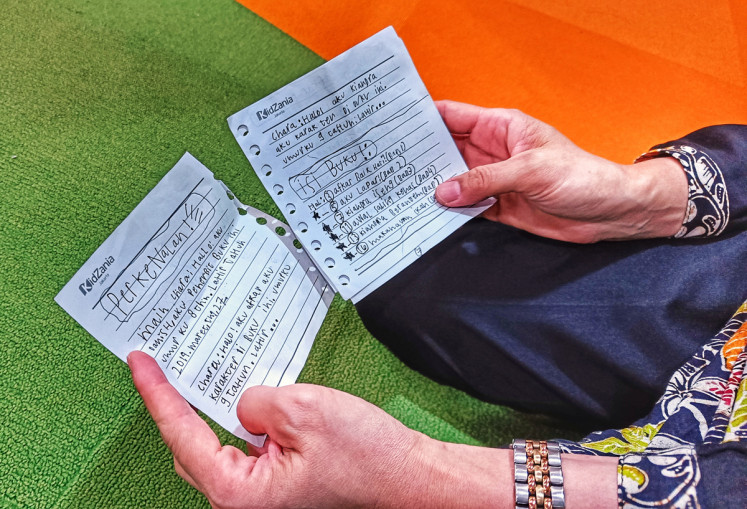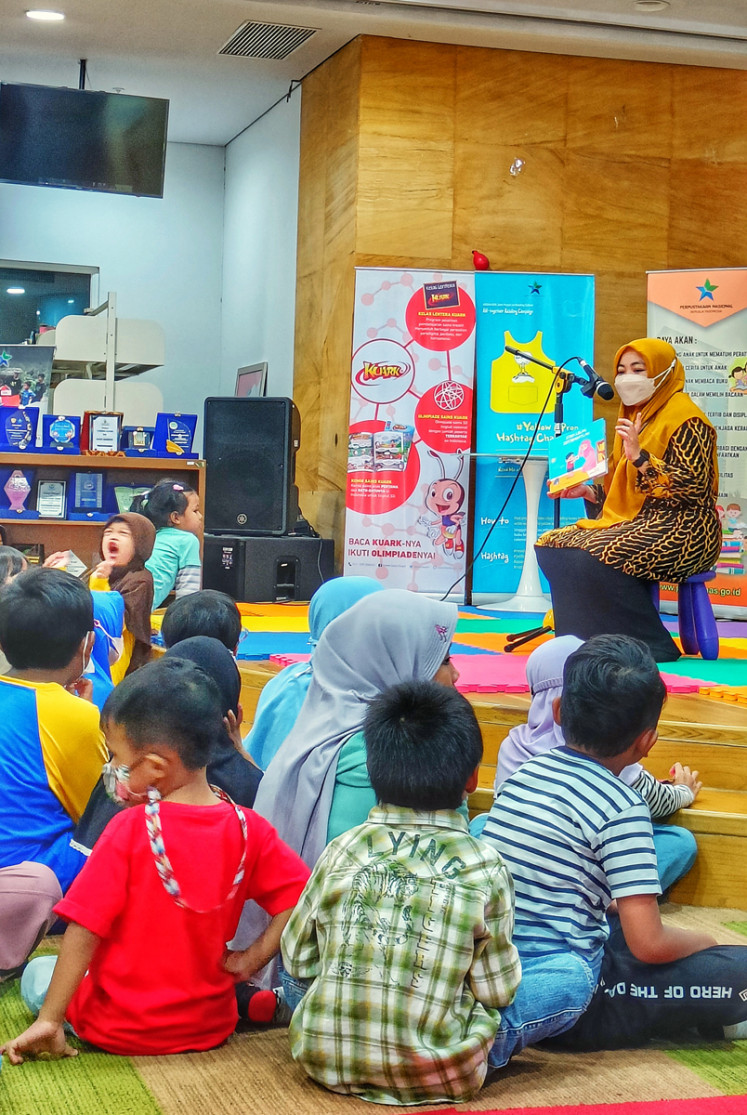Popular Reads
Top Results
Can't find what you're looking for?
View all search resultsPopular Reads
Top Results
Can't find what you're looking for?
View all search resultsReading aloud to children builds a love of reading
Reading aloud to children helps improve their language and reading competency and builds their creativity.
Change text size
Gift Premium Articles
to Anyone
L
ibraries project a quiet and serious ambiance. But they can also be a fun and exciting place where adults and children share their love for reading.
One afternoon, The Jakarta Post visited a group of children between three and 13 years old sitting around a mini stage at the Children Services Center on the seventh floor of the Perpustakaan Nasional (National Library), Central Jakarta. Their eyes sparkled as Primadita, one of the librarians at the institution, showed them a picture book that she was going to read aloud. Some of the children clapped their hands in excitement.
On Mother’s Day, Dec. 22, 2022, the National Library hosted the event Read Aloud: Ibuku Perpustakaan Pertamaku (Read Aloud: My Mother Is My First Library). More than 40 mothers and children participated in the event.
“Parents will never regret reading books to their kids,” Primadita said. “First of all, it’s gratifying. And more importantly, it induces the love of reading among young kids.”
Encouraging Indonesian children to read is indeed very important. In the Programme for International Students Assessment (PISA) survey in 2018, Indonesian students scored 371 in reading proficiency, one of the lowest among participating countries.
“It’s a severe problem,” Fadila Kosasih, volunteer at the 1001 Buku, Ayo Dongeng Indonesia, and WikiHa! Communities said. “We’ve visited schools and universities in many different parts of the country and discovered that most students have difficulty understanding textbooks. And when I asked, many of them confessed that they disliked reading.”
Fadila agreed with the librarian that parents can encourage their children to read by reading books aloud to them from a very young age.
Fostering the love for books
“Parents can start reading to their kids when they’re still in the womb,” Fadila said. “Studies reveal that [unborn] babies can hear voices from outside the body starting from six months old.”
“Reading aloud to them during this phase helps promote brain activity and early language competency development,” the volunteer reiterated.
But which books should parents read aloud to their children?
“Let [the kids] choose,” Fadila said. “Arrange a special date with your kids to visit a local bookstore or library to hunt for books. And then, allow them to pick the books that interest them. It will help get them more engaged [with the story] during the reading.”
You and your children should also schedule a particular time for the read aloud sessions.
“It doesn’t have to be during the night when both of you are probably tired,” the volunteer said. “Ideally, you should choose a time when both of you are fresh and relaxed.”
And parents can finish one book or chapter in one reading.
“The goal is not to finish the book as soon as possible,” Fadila said. “What’s more important is to get the kids to actively participate in the [read-aloud] sessions.”
Animating the inanimate objects
Parents should first read the books that they are going to read aloud to their children.
“Parents should grasp the book’s plot, main characters and morals before reading it to their kids,” Fadila said.
That afternoon, the volunteer showed the book cover to the children before reading it to them. She then asked them to name the animals on the surface. Several children raised their hand and jumped excitedly as they were told their answers were correct.
The volunteer then proceeded to read the book's title and its author and illustrator.
Sharing stories: Primadita reads aloud to a group of children at the Kids Services Center of the National Library on Dec. 22, 2022. (JP/Sylviana Hamdani) (JP/Sylviana Hamdani)“Children need to know that books don’t just exist by themselves,” Fitriana Ramadhani, senior librarian at the National Library, explained. “They need to know that there are authors and illustrators that create the book. And one day, they can also be [authors or illustrators] like them.”
The volunteer then opened the book's first page, facing the children, and read the story in a calm and clear voice. From time to time, she raised and lowered her intonation to match the situation portrayed in the book. She also pointed to the book’s illustrations and asked the children to describe them.
“[The activity] animates the inanimate object,” Fitriana said. “Well, books are inanimate objects. But during read-aloud sessions [it seems that] the book becomes alive.”
“In this way, read-aloud [sessions] help children discover the fun in reading and boost their creative imagination.”
Fitriana has read books aloud to her three children since they were babies.
“Now they love reading so much that they have started writing,” the senior librarian said.
She took out a pocketbook, written and illustrated by her nine-year-old child, Danish, and showed it to the Post.
The handwritten book, made of folded notebook papers and joined together, tells the daily activities of Danish and his two close friends, Afrar and Kianora.
“His elder brother, aged twelve, has also written a similar book,” the proud mom said.
Bonding time
The Children Services Center at the National Library has over 12,000 titles of children's books, which consist of comics, picture books, storybooks, science books and encyclopedias. Approximately 100-200 children visit the library each day. The number usually quadruples during school holidays.
Among the library’s frequent visitors are Atira and Galia. On that day, these seven and nine-year-old girls came to the library with their mom, Detik Rena.
“We have lots of books at home and yet the kids always urge us to visit the library every week,” Detik said. “We usually spend a couple of hours here as they read the books that interest them in the library and then find some more to borrow and read at home.”
Detik believes that her children’s massive appetite for books came from her habit of reading aloud to them since they were babies.
“When they were babies, I read board books to them,” she said. “At first, they didn’t understand the stories and threw the books around. But now, they can’t be separated from books. And their reading comprehension has also grown far beyond that of their peers.”
Both children love to read children’s novels that are full of text now.
“They can read by themselves now,” Detik said. “But they still ask me to read aloud to them before they sleep at night.”
Read-aloud sessions improve children’s language and reading competency and help them recognize their emotions and healthily express them.
“As parents read the stories aloud, young kids will learn to identify the main character's emotions, as well as their own,” Primadita said. “And it will help minimize tantrums as the kids learn to communicate their feelings better.”
Reading aloud also helps parents bond with their children.
Primadita feels very close to her father and grandmother, who read wayang (Javanese puppetry) books to her every night before going to sleep during her childhood.
“Those stories were fascinating and had encouraged me to look for more [wayang] books in libraries and read them myself,” Primadita said.
“In a way, I think [the read aloud sessions] have inspired me to become a librarian.”
Today, Primadita can read all the wayang books she desires at the National Library workplace.
“And I can also read aloud to children [visiting the National Library] and impart the love of books like my father and grandmother once did,” the librarian concluded.













